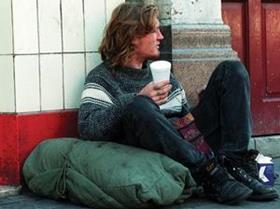Working closely with our property industry supporters LandAid is going to help end youth homelessness.

LandAid is changing. This year roughly 83,000 of our young people will experience homelessness. Nearly 4,000 of them will sleep rough for at least one night. And this is in the fifth wealthiest country in the world. In 2015.
Last night, Liz Peace, LandAid’s chairman and I described what we’re going to do to respond to this crisis. Working closely with our property industry supporters and with expert charities, LandAid is going to help end youth homelessness.
LandAid already makes a real difference. We’ve funded some great projects over our 29-year history, and last year alone LandAid grants totalling £1.2m helped nearly 8,000 vulnerable children and young people right across the UK.
But LandAid and the property industry’s potential to make a real and lasting difference within society is far greater. It is immense. And it is this potential that our new ambition will harness.
Of course, the property industry is no stranger to making a difference, nor to immense challenges. Our partners produce millions of square feet of office and retail space, record-breaking towers, eye-watering transport hubs and mind-bending infrastructure. The industry has changed, is changing and will continue to change the face of this country and its economy.
But this is not enough.
We all recognise the growing gulf between rich and poor, between those with opportunity and those without, those able to make a good life for themselves and their families and those that can’t. As austerity bites and the state contracts, so, increasingly, people will look to the corporate world to step up, and step in.
Historically generous, the property industry is well placed to help. Property companies invest significant sums in charities close to their hearts every year. The calendar is filled with fundraising events and galas, and companies are investing more in adding social value wherever they work.
The challenge, though, is impact. Funding countless projects all of which do good can dissipate the impact of corporate giving – it’s the sprinkler hose rather than the jet-wash approach.
I’m not arguing for property companies and their staff to give less. If anything I want to see more charities benefitting more. But what I really want is to help the property industry find its own charitable jet-wash setting. I want to harness some of the industry’s generosity and goodwill and focus it on achieving lasting and extraordinary change.
Confronted by the sight of anyone living on the streets – especially if they’re a young person – we can be daunted by the scale of the challenge, by the reality of so many shattered lives. “What can I do? How can I help?”
Youth homelessness charities aren’t daunted, and they know what to do. Which is why, from next year, all our grant-making efforts will go to supporting small to medium-sized charities around the UK working to end youth homelessness. They have the skills and expertise, and can build the trust needed to work with the thousands of young people who turn to them for help.
And together, united behind LandAid, we can help them. With money, free professional property advice and the support that LandAid offers so well, we can make a massive difference.
We will not succeed alone – we need to work closely with charities and other funders, as well as with government. Nor will we succeed overnight – which is why we are committing to this cause for at least the next 10 years.
Today we ask you to join us in creating a new and unique charitable collaboration, the property industry uniting through LandAid to end youth homelessness.
Join the movement at www.landaid.org
Paul Morrish is chief executive of LandAid
Siobhan’s story – a LandAid case study
Sometimes we can take our families for granted. Siobhan doesn’t. “My dad died when I was 13 so I had to go and live with my mum but she had an abusive partner.”
Without much money and in fear of their safety, Siobhan and her mum fled. But a succession of B&Bs and temporary accommodation hardly improved matters. Siobhan was doing her GCSEs, but with nowhere quiet to study, and having increasing distances to travel just to get to school each day, she became unwell. The relationship with her mother became increasingly strained, until she left home. She was 15.
She spent some time sleeping on friends’ sofas, but eventually their support dried up and Siobhan was on her own.
That was when one of the charities LandAid supports stepped in and provided Siobhan with a place she could begin to call home.
“I like it here. They’re very supportive of what you need to do and where you need to be. I’ve told my support worker that once I’ve finished my A-levels I want to go to university, so they’re trying to help me with that now. I want to be a barrister, the ones that are actually in court wearing the wigs. I don’t know where it’s come from, but I feel like I want to be able to make a difference and give people justice.”
She has been elected a resident rep and is also part of the project’s youth council. She has trained as a mental health volunteer support worker and is doing a life skills programme to help her when she leaves.
“I feel like I’ve changed as a person here. Obviously I’m much happier now. It is hard being the age I am, being on my own, with my mum and dad not around. I wouldn’t have been able to do that so easily without the help of the support workers here.”






























No comments yet